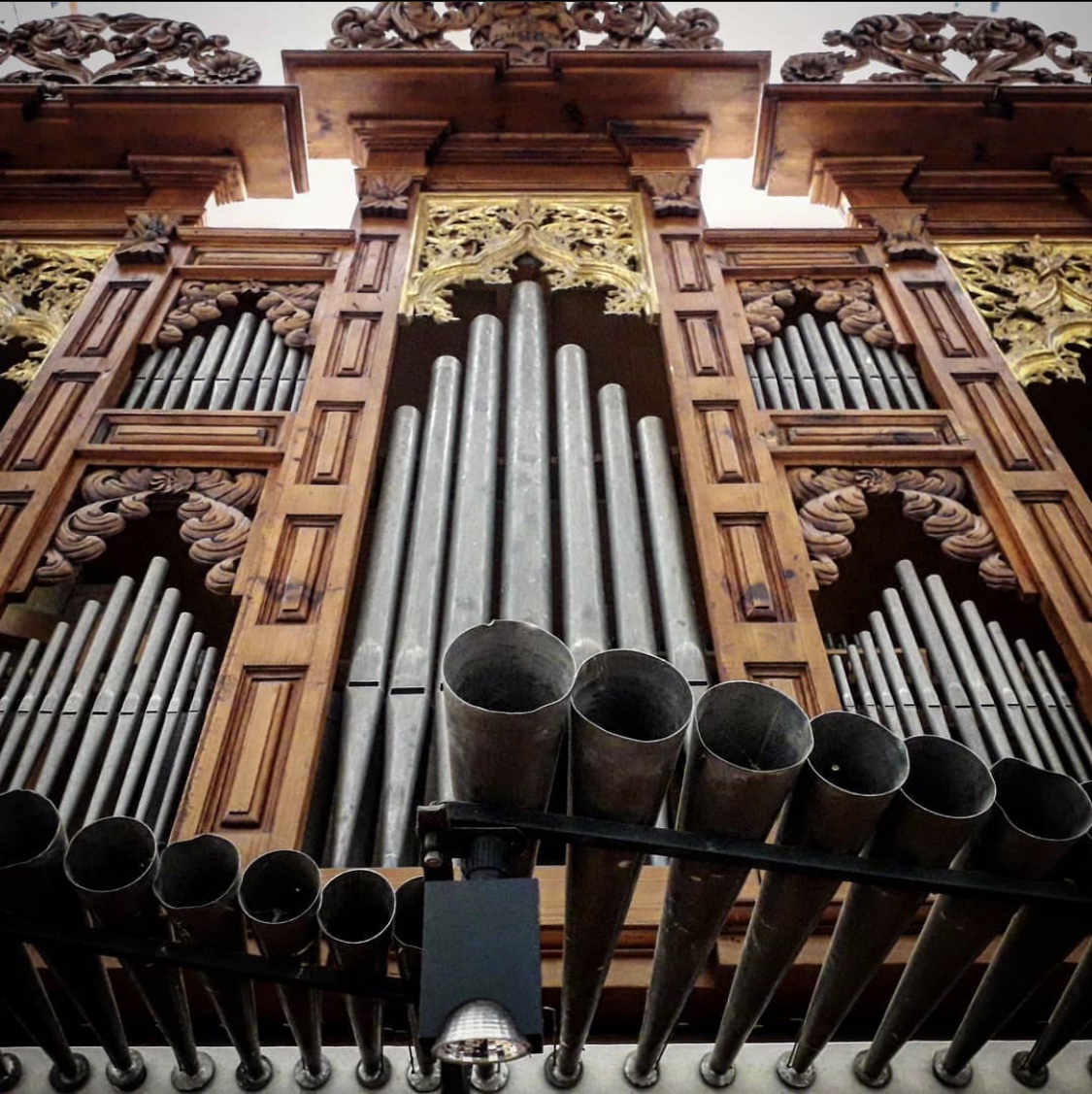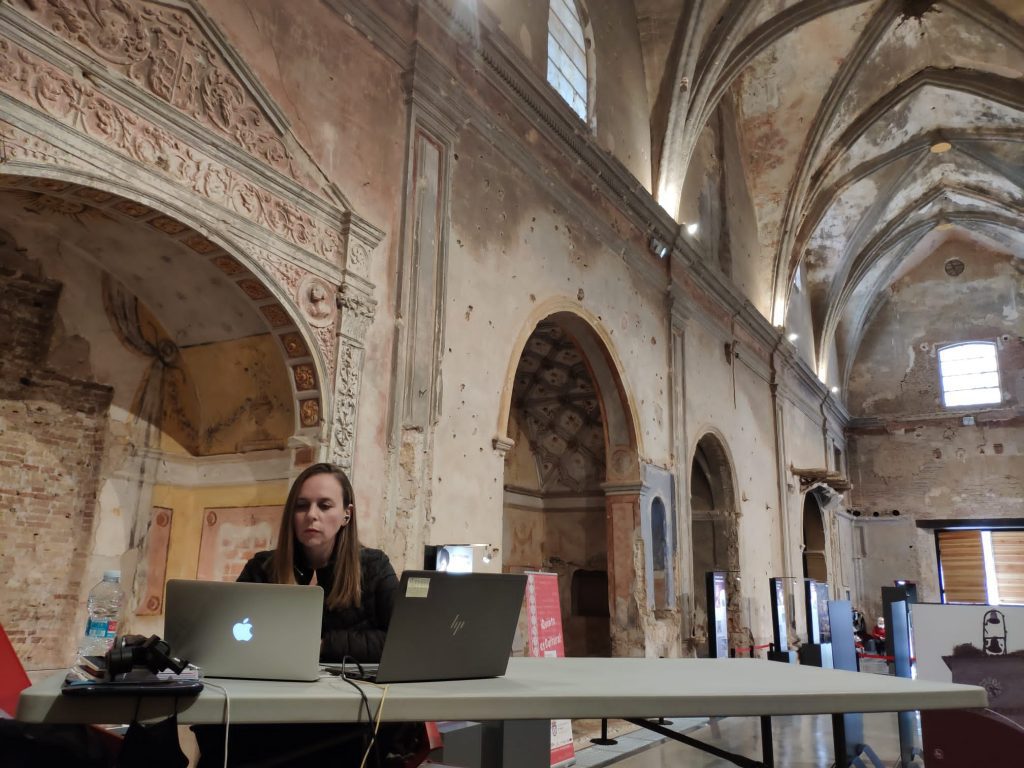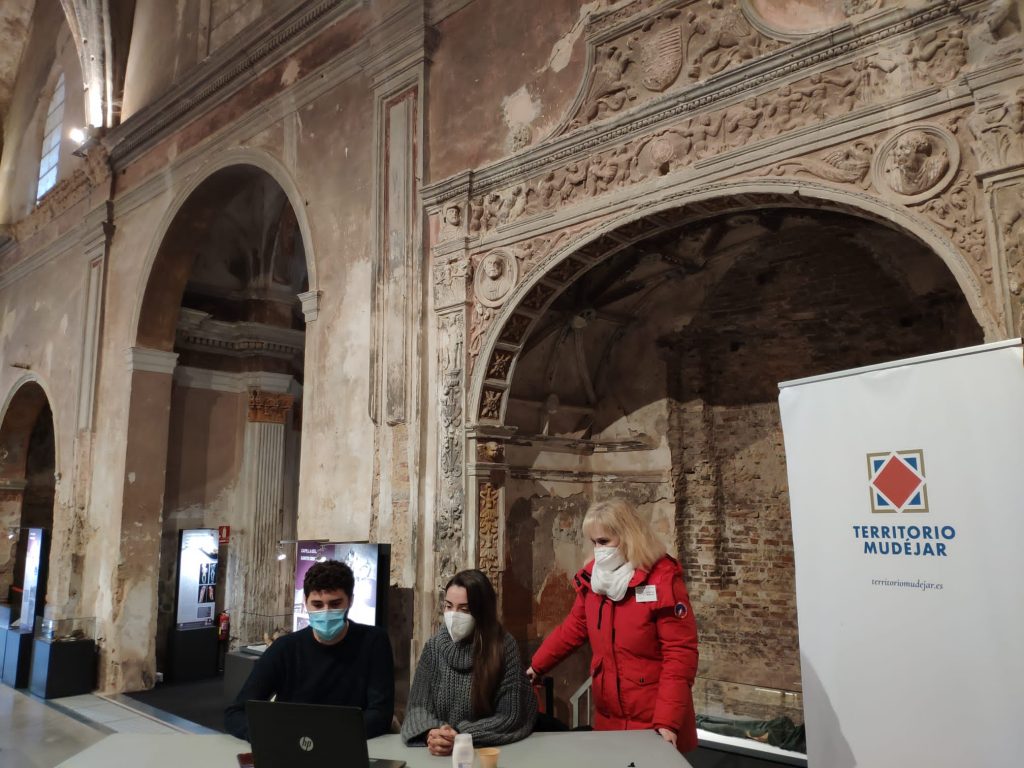3rd Call for applications Gonzalo M. Borrás Gualis fieldwork grants and projects
Territorio Mudéjar announces the third edition of the Gonzalo M. Borrás Gualis fieldwork grants and projects aimed at directly supporting the work of researchers and project promoters who want to work on the development of villages through the responsible and sustainable use of cultural and natural heritage resources.Territorio Mudéjar is an association of town councils, currently thirty-six member councils and one collaborating partner, whose objective is to consolidate a unified and collaborative management network for the use of the historical-artistic resources linked to the important Mudejar heritage, understanding them as an engine for the development of the villages and as an element of identity for the maintenance of the communities that make up our territory.
Our programme of actions for the coming years has been designed in accordance with the strategic lines defined by the “Roadmap of the Council of the European Union 2019-2022” (Plan de trabajo del Consejo de la Unión Europea 2019-2022) which, aligned with the objectives of the 2030 Agenda, have as their guiding principle that “the cultural identity of the territories will contribute to sustainable social and economic development by differentiating markets and in turn allowing their integration into a diversified economy that can ensure their future success”.
The projects carried out in 2020 have consolidated one of our most important lines of work based on the development of actions that strengthen the retention and attraction of talent, actions aimed at the construction of highly qualified professional networks linked to the use of historical-artistic and cultural resources, contributing to medium and long-term territorial development.
Dedicated to Professor Gonzalo M. Borrás Gualis, a strong advocate of the management of the heritage of Aragon and the territory, as an action of the people and as an innovative field of work full of future. His work exemplified with perfect coherence the possibility of combining research work of high scientific impact with a commitment to the land and its people, not only favouring the knowledge, conservation and dissemination of its historical and artistic heritage, but also modernising work processes and proposing innovative projects in which natural, cultural and heritage resources are a key element in the future of the villages.
Rules
1/ Purpose and scope
The purpose of this call for proposals is to award FIVE GRANTS and ONE ACCESIT to researchers and professionals in the management of cultural and natural heritage for the development of a research or territorial project with a highly innovative character within one of the fields of activity or area of work specified below.Proposals may address zero or preparatory phases, development phases or piloting and testing phases of ongoing projects.
Proposals must include as a fundamental part of their development a justified physical stay in one or more of the localities of Territorio Mudéjar. The projects presented must demonstrate direct impact on at least three partner localities of Territorio Mudéjar and provide evidence of influence of this impact on the rest of the territory.
Objectives:
- To favour the knowledge of the rural territory based on its Mudejar identity through innovative approaches whose main aim is to have a positive impact on the villages.
- To encourage projects with a high territorial impact developed from the experience of the habitability of the villages.
- To help in the creation and implementation of a working network with a common vision of the possibilities of heritage, cultural and natural resources that helps to strengthen the rest of the sectors through interdisciplinary and collaborative work.
- To create mechanisms for social participation in the field of heritage resource management from a territorial perspective.
- To promote knowledge of heritage resources in order to favour the implementation of projects, contribute to better protection and favour the conservation of the Mudejar heritage of the villages.
- To contribute to a better knowledge of UNESCO World Heritage and the benefits it brings to the territory as an international brand.
- To give special support to projects that refer to the previous sections and that include two or more towns of Territorio Mudéjar.
- Support projects that serve as a framework for action for a wide range of sites or assets, or that propose solutions and formulas that contribute to improving the sustainability and management capacities of Mudejar Heritage in general.
- Support projects that help to promote the social function of cultural heritage.
The areas covered by the call are the following:
AREA 1. New perspectives on Mudejar art:
– Updating of data and knowledge on Mudejar heritage in all its diversity: Monumental, urban, ethnographic, linguistic, agrarian, hydraulic, geography, materials, processes, etc.
– Technical languages applied to the Mudejar: planimetry, photogrammetry and Mudejar 3D.
– Geolocation, cartography and maps.
– Any subject that allows to broaden the scientific base on Mudejar art.
AREA 2. Territorio Mudéjar-Cultural Landscape
– Heritage resources and people’s actions
– Natural and social contexts
– Interactions between landscape and monumentality
AREA 3. Cultural heritage management:
– New models of use beyond the classical concept of “tourist or recreational use”.
– Physical, economical and intellectual accessibility studies
– Future models for conservation or intervention.
AREA 4. Communication and dissemination of Mudejar heritage
– Mudejar heritage and the media
– New media discourses
– Interpretation and ways of accessibility to knowledge of Mudejar heritage.
AREA 5. Mudejar heritage and its social function as a key element of territorial development
– The emotional bond as a key element for the care, protection and management of heritage.
– Population contexts: The value of intergenerational experience.
– Social participation in the appreciation, exchange and collective construction of knowledge and new forms of learning.
The procedure for awarding grants will be processed on a competitive basis according to the assessment criteria established in the call for applications and, in accordance with Article 22.1 of Law 38/2003, of 17 November, the General Law on Subsidies.
2/ Applicants
Proposals may be submitted by natural persons and groups of natural persons without legal personality who meet all the requirements of this call for proposals.The applicant (or group of applicants) may be at an initial or intermediate stage of their research career or professional activity and must provide proof of the following:
- Higher education related to the areas covered by the call for proposals.
- Master’s degree in Cultural Heritage Management, or related to one of the proposed areas of work, or documentary evidence of a minimum of two years of research or professional career -remunerated or not-.
When the project is presented by two or more persons, the formula will be called “team” and each member of the team must be accredited individually.
If the project submitted is part of a research project linked to a university, public research centre or private (non-profit) centre, this must be indicated in the project report.
The acceptance of the project and the development of the stay is compatible with other professional activities as long as the mode of compatibility is specified and justified in the project report.
The project submitted may have other sources of funding as long as they are complementary and are specified in the project report. Total income may never exceed the project development costs.
3/ Requirements
Bachelor’s, Graduate’s or Architect’s degree or equivalent.- Master’s degree in specialised heritage and/or in the various related areas or accredit a minimum of two years of research experience and/or professional career in the field in which the proposal is developed (whether remunerated or not).
- Be up to date with their tax and social security obligations, as well as accrediting compliance with obligations due to the reimbursement of subsidies.
- Not be affected by any of the causes established in art. 13 of the LGS.
4/ Deadline for submission
The deadline for submission of applications is MONDAY, 12 July 2021. Proposals sent by e-mail will be accepted until 23.59 hours (Spanish peninsular time).If the application contains errors that can be corrected, the organisation will inform the applicant so that, within three days from the date of communication, the correction can be made as an essential condition for the application to be taken into account in the evaluation process.
5/ Characteristics and conditions
Period: The schedule of projects and stays may be carried out until 24 December 2021. The project completion report must be submitted by 29 December 2021 at the latest.Duration: Proposals must be developed within a minimum period of THREE months and a maximum of FIVE months.
Funding: Projects will have a maximum financial allocation of €6,000.00 (in the case of the accesit the maximum financial allocation will be €4,000.00) which must be justified in the project report according to the expenses indicated in the following section.
Expenses attributable to the grant: The budget must identify the concepts subject to and deriving directly from the needs of the project – for example: expenses derived from the development of the work, materials, travel, meals, accommodation, others – including, if applicable, the corresponding taxes.
In the event that the project has other sources of funding, the following must be specified: Entity, duration, actions financed (object and content) and to which part of the project it is addressed.
Compatibility: The development of the stay is compatible with other work, professional or research activities justified to the organising entity. The project must indicate the degree of compatibility and the method of work to be carried out in order to avoid overlapping and non-compliance with the conditions indicated in this call.
Number of calls: Beneficiaries may not obtain full grants in more than two consecutive calls for the same project. Therefore, resident researchers who have been beneficiaries in the last two calls will not be eligible to apply for the call and will be excluded if they do so.
** Exceptionally, researchers who have not exceeded the amount of €12,000.00 in two consecutive calls may be considered as beneficiaries if they have been awarded an accesit in previous years’ calls.
Other: Beneficiaries will be included in the entity’s civil liability insurance.
The beneficiaries will not establish any type of employment relationship with the organisation.
All grants will be subject to the withholdings and taxes stipulated by the legislation in force, which will be deducted from the corresponding economic funding.
6/ Applications
Applications must be sent to the association Territorio Mudéjar in digital format to the following e-mail address: info@territoriomudejar.es- Application – Basic identification data of the applicant and the project-.
- Copy of ID card.
- Summary of the applicant/s professional career (max. 2,000 characters).
- Summary of the project/proposal (max. 2.000 characters)
- Abbreviated academic and professional curriculum vitae (max. 5 pages)
- Five developed projects that, in the applicant’s opinion, are relevant as a starting point for the proposal (Synthesis of each project of a max. 2.000 characters)
- Report of the project to be carried out, including (max. 5 pages): Title; Background and current state of the subject; Hypothesis, methodology, work plan and timetable; Description of the specific objectives of the project; Towns directly and indirectly affected by the proposal; Town or towns proposed for stay and expected length of stay; Detailed budget for the research, which will refer to the amount requested.
- Optionally, a letter of recommendation from a relevant person in the field of the proposed work may be provided.
- In the case of teams, both the application and the award decision must expressly state the implementation commitments assumed by each member of the team, as well as the amount of the grant to be applied by each of them, who will also be considered as beneficiaries. A sole representative or proxy of the grouping must be appointed, with sufficient powers to fulfil the obligations which, as beneficiary, correspond to the grouping. The team will undertake not to dissolve the grouping until the period of limitation stipulated in Articles 39 and 65 of Law 38/2003 of 17 November has elapsed.
7/ Selection process and criteria
The project selection process will be carried out on the basis of the evaluations of the Scientific Committee and the entity’s management team, which will draw up a ranking according to the following criteria:- Curricular profile, training and previous accomplishments of the applicant: 15%. The orientation of the curricular profile in relation to the area of work chosen by the applicant will be assessed.
- Quality of the project and innovative nature of the proposal: 35%. The project will be valued for being well thought out and presented in a rigorous and detailed manner. The framework of objectives/actions/resources/budget must be well planned. The calendar must be realistic. The project should provide for its evaluation and future viability.
- Area of impact / no. of localities involved: 35%. The way in which the project acts on the territory will be assessed. It may be a present or future direct impact, but in any case it will be an indispensable requirement. It will be highly valued to foresee a realistic impact without falling into the tendentious and mediatic.
- Complementary activities involving the local population: 15%. Planning an activity that involves the local population in the development of the project will be valued. Involvement does not necessarily have to be through a cultural activity. The introduction of activities that have an unconventional cultural impact will be valued.
8/ Evaluation and decision
The decision will be communicated as of Monday 19 July 2021.The call may be declared totally or partially void and the decision of the commissions shall be final.
Once the call for applications has been resolved, the list of beneficiaries and the composition of the evaluation committee will be published on the website of the association Territorio Mudéjar www.territoriomudejar.es.
Under no circumstances will individualised information be provided on the applications received or on the deliberations of the evaluation committee.
9/ Formalisation, justification and payment of the grants
Formalization: Beneficiaries must sign before the start date of their project, according to the calendar, and at the latest before 1 August 2021, the acceptance commitment that will act as an indispensable document for the receipt of the aid. Once the acceptance document has been signed, they must join the project on the date indicated in the calendar.
Payment: Payment of the grant will be made in three instalments: 40% at the start, once the acceptance commitment has been signed; 40% halfway through the project; and the remaining 20% upon submission of the final project report. These conditions will be general to all beneficiaries unless, exceptionally, the project report justifies the need for a different financial distribution over time.
Justification and presentation of results: Beneficiaries will be obliged to justify compliance with the requirements and conditions established in this call for proposals by means of: A mid-term report halfway through the stay that allows the progress of the project to be evaluated. A final report of the project in digital format describing objectives, fulfilment of aims and results; and an economic report justifying the cost of the activities carried out.
Financial control: The mid-term report must include a review of the estimated budget, either confirming its continuity or proposing the necessary adjustments, provided they are justified.
The final report shall include a detailed financial report as follows:
- A list of expenses incurred indicating creditor, amount, date of issue and payment. As the project includes a budget estimating the list of expenses, it shall be classified according to the items of the subsidised project or activity. Where applicable, any deviations that may have occurred in the development of the project must be justified.
- Proof of payment: Invoices, tickets or accrediting documents and proof of payment. If the payment has been made in cash, this must be indicated in the expense document with the concept correctly specified.
- The justification of fees will be made by sworn statement and will be detailed in the report according to the results developed, specifying the working hours assigned to the actions carried out.
- The justification of mileage expenses shall be made by means of a sworn declaration and a detail shall be included in the report according to the results developed, specifying the journeys made and assigned to specific actions.
Non-compliance: The grants will be cancelled and the amounts received will be refunded when the conditions established in these rules are not met and in general in the cases established in accordance with article 37 of the General Law on Subsidies.
10/ Dissemination of the Project’s results
The association Territorio Mudéjar may request the collaboration of the beneficiaries of the grants in activities for the dissemination of the projects. To this end, the beneficiary shall provide the association Territorio Mudéjar with all the information and documentation required and shall provide the latter, free of charge, with the appropriate rights for the dissemination of the results.
Beneficiaries must mention on materials or results the source of the grant by means of the phrase “Project carried out with funding from Territorio Mudéjar through the call for applications Estancias Gonzalo M. Borrás Gualis 2021” and include the organisation’s logo whenever possible.
On the other hand, the association Territorio Mudéjar will always identify the authorship of the projects.
11/ Acceptance of the rules
Participation in this call for applications implies acceptance of its rules and its decision, which shall be final, as well as the waiver of any type of claim.Exceptionally and for duly justified reasons, the association Territorio Mudéjar reserves the right to interpret and modify the wording of the rules in order to clarify or specify their content, without this implying a substantial or arbitrary alteration of the same.
For any queries, applicants may contact the association Territorio Mudéjar by e-mail at info@territoriomudejar.es


















